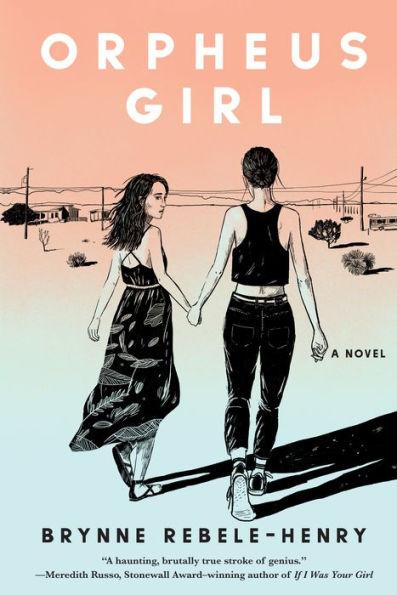
YA FICTION
Brynne Rebele-Henry
Orpheus Girl
Soho Teen
Hardcover (also available as an e-book and an audiobook), 978-1-6412-9074-6, 176 pgs., $18.99
October 8, 2019
Orpheus Girl by Brynne Rebele-Henry is a unique story about a young lesbian’s response to her budding sexuality and her struggle to face the expected judgment and backlash.
Raya is a teenager living with her grandmother after Raya’s mother abandoned them years ago. Both granddaughter and grandmother live in a perpetual state of waiting and expectation. Raya waits for her mother’s return, and her grandmother desperately tries to claim a second chance at raising the perfect child.
Orpheus Girl taps into the Greek myth of Orpheus who tries to save his wife, Eurydice, from the depths of hell. Orpheus Girl employs a mythical tone as Raya confronts her mother’s absence, her grandmother’s chronic disappointment in her, and her shifting feelings for her best friend, Sarah. Throughout their adolescence, both girls tentatively begin exploring each other’s emotions and bodies, but citizens in Pieria refuse to tolerate anyone who identifies as anything other than heterosexual. Rebele-Henry impressively captures the suspicion, uneasiness, and horror as people drown in their self-made sea of homophobic fear and loathing.
On the surface, Orpheus Girl is about an antiquated town whose citizens send their gay sons and daughters away to be cured. No one talks about it; these young people simply disappear. When Raya and Sarah are eventually discovered, revealed as lesbians, and outed, the dreaded banishment is worse than they ever imagined. First Sarah is sent away to Friendly Saviors, and Raya assumes the role of Orpheus, who will stop at nothing to save her girl from hell.
Rebele-Henry has a true gift for mythological prose and imagery. Raya’s surgery at birth to correct malformed vertebrae creates the heartbreaking imagery of clipped wings, which is a major theme throughout the story. Raya may have lost her wings, but when she tries to save herself and Sarah, she discovers she can still find freedom on the wings of courage and love. Rebele-Henry’s established poetry skills shine in Orpheus Girl.
The diction is expressive and melodic, providing an ethereal construction that positions the reader in the mind, heart, and soul of a troubled teen whose sexual identity is still forming and solidifying. The story tragically outlines the angst and invisibility that many adolescents experience, especially when their sexuality is questioned, ridiculed, and demonized. When Raya and Sarah are sent to Friendly Saviors to be cured, the story dramatically shifts from a relatable coming of age to a far more troubling scenario of physical and mental abuse.
Orpheus Girl might be uncomfortable for some readers, but it succinctly highlights the danger of ethnocentrism, especially homophobia. Raya does not fit neatly into the box that her grandmother and the righteous citizens of Pieria have created for her; therefore, she is broken and must be fixed. Rebele-Henry handles this distressing reality with both grace and asperity through her remarkable characterization and a symbolic, mythical narrative that infuriates and frustrates yet provokes deep insight and reflection.
Unlike the Greek myth of Orpheus and Eurydice, Orpheus Girl ends on a tenuous note of hope. All readers will benefit from this short, poetic story because while it is an engaging work of fiction, it is also a harsh reminder that no one should be thrown away or forced to change because they are different. Everyone needs to step outside of their comfort zone and experience empathy for others, and Orpheus Girl is an exceptional vehicle for reaching that vantage point filled with discovery, enlightenment, and tolerance.
Brynne Rebele-Henry's poetry, fiction, and nonfiction have appeared in such journals as Prairie Schooner, Denver Quarterly, jubilat, Fiction International, Rookie, and So to Speak, among other places. Her writing has won numerous awards, including the 2015 Louise Louis/Emily F. Bourne Poetry Award from the Poetry Society of America, the 2016 Adroit Prize for Prose, and a 2017 Glenna Luschei Award from Prairie Schooner.
Her first book, Fleshgraphs, appeared with Nightboat Books in 2016. Her second book, Autobiography of a Wound, won the 2017 AWP Donald Hall Poetry Prize and appeared with the University of Pittsburgh Press in 2018. Her first novel, Orpheus Girl, was published in October 2019 by Soho Teen.
